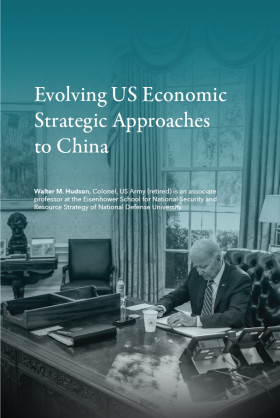Evolving US Economic Strategic Approaches to China


Excerpted from "Reshaping US-Japan Economic Security Partnership in the Indo-Pacific," Walter M. Hudson analyzes changing US conceptions of national security and economics.
The United States has embraced a strategic rethink towards economic security in an attempt to engage in geoeconomics in recent years. Largely spurred by the rise of China and a recognition that economic considerations are inextricably linked to national security concerns, US efforts to develop an economic strategy have evolved along a general trend with two variations: a “small yard, high fence” approach and “industrial strategy.”
This first approach can be characterized as developing along a strategic center of gravity called “invest/align/compete” against China and shaping international order in the favor of the United States and its allies and partners. At the same time, this strategy keeps the door open to economic interaction with China, particularly if it behaves as a responsible actor within the current order.
The second, more forward-leaning approach developed as the administration hardened its approach over time in 2022. In particular, the United States now aims to maintain an edge over China technologically, by both investing at home and preventing Chinese access to bleeding edge critical technologies. This is partially a response to the scale of the challenge posed by China and other revisionist states, notably Russia following its unjustified invasion of Ukraine. Importantly, the “industrial strategy” approach includes a greater willingness to challenge existing features of the post-war international economic order and to engage in industrial policy.
While debate continues to rage, including about “peak China,” this merging of previously siloed economic and security policy signals a new era in US strategy.
Author

Associate Professor, Eisenhower School for National Security and Resource Strategy, National Defense University

Indo-Pacific Program
The Indo-Pacific Program promotes policy debate and intellectual discussions on US interests in the Asia-Pacific as well as political, economic, security, and social issues relating to the world’s most populous and economically dynamic region. Read more

Explore More
Browse Insights & Analysis
Promoting Convergence in US-Brazil Relations

360° View of How Southeast Asia Can Attract More FDI in Chips and AI

Israel Escalates Attacks in Gaza: What’s Next?
